"Surfing the multilingual Bible Hub I see many languages or versions, but I don't see any Hannan (or Sino-Vietnamese) Bible, so I have to get it from the modern Vietnamese language translation and writings." This is the voice of CHEN Jianan, the translator of the Hannan Bible.
Since 2012, she has studied and translated modern Vietnamese and has translated it into the Hannan text. Chen has translated the Hanna version of various books of the Bible including Genesis, Psalms, Proverbs, Song of Songs, Matthew and and some chapters of Exodus and in January 2019 they were published. The rest of the Bible has yet to be edited and published.
Based on the modern Vietnamese biblical translation from the Multilingual Bible Hub (https://biblehub.com) , the translation has taken reference from the Chinese Union Version (CUV) traditional character Bible. The work was edited into a combination of modern Vietnamese, Hannan, and CUV.
Hannan is the traditional writing system of Vietnam in the 15-19th century, which is a mixture of Chinese characters and Vietnamese characters. In 1920, French Catholic missionaries created a Vietnamese writing alphabet for Vietnam, which replaced the Hannan and is used to this day.
Chen Jianan introduced it in Southeast Asia. Vietnamese is the only Southeast Asian language that has not been affected by Indian culture. The way its characters were formed is similar to Korean or Japanese, and since ancient times it was influenced by the far-reaching Chinese culture. From the 1-10th century AD, a large number of Chinese words were incorporated into Vietnamese, and their pronunciation was called Sino-Vietnamese, similar to the ancient Chinese phonetic.
Early Vietnam used Chinese characters and later borrowed Chinese characters which were transformed and mixed into the Hannan system, a Chinese character type of Mandarin. However the mixed text was only used to write some literary works such as poetry. As to recording, writing, and official documentation, it is still not recognized and has not achieved "orthodox status". The appearance of the Hannan script was only in its literal stage when it was changed by the French into a modern phonetic Vietnamese without being further developed.
Chen Jianan thinks that the translation and transliteration of the modern Vietnamese language of the Bible gives her more discoveries and understandings of Chinese words. For example, a change of a common radical causes the pronunciation to change which is not related to the original word or common radical or all components.
Chen said, "The Hannan Bible can be used by Vietnamese scholars and Chinese and Vietnamese language and culture researchers for reference, comparison and discussion.
- Translated by Charlie Li












